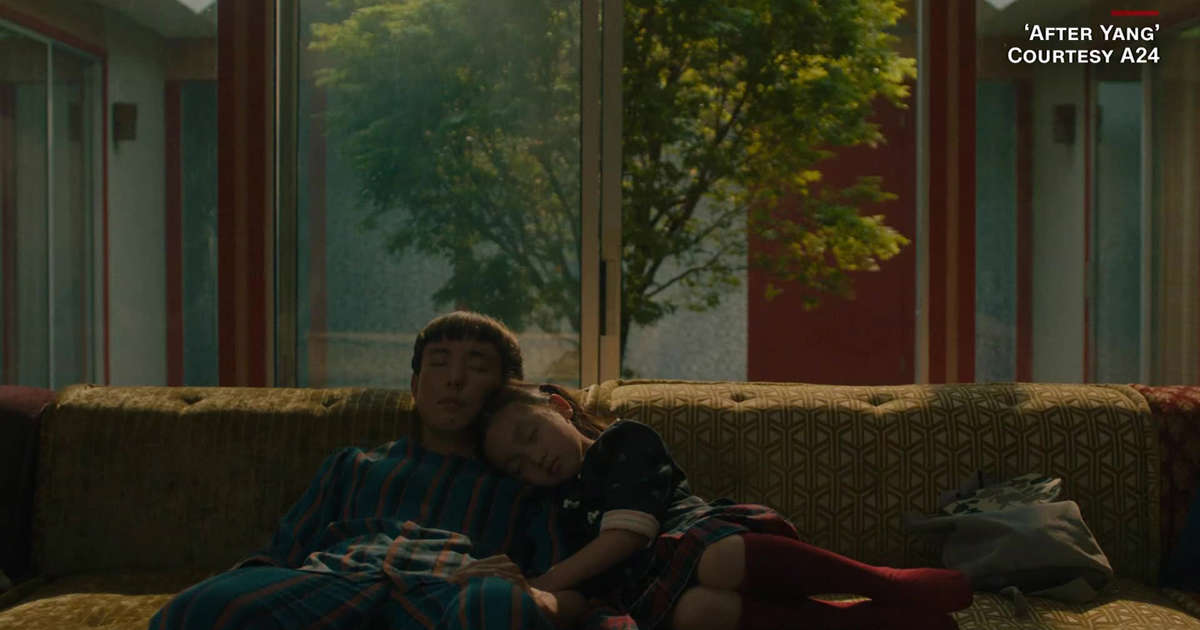
“That’s such a human thing to ask. We always assume other beings would want to be human, what’s so great about being human?”
After making his full length feature debut in the director’s chair for 2017’s Columbus, Kogonada returns to our screens with a new film that also contemplates the nature of human interaction, and humanity itself, this time with a bit of a science fiction twist. After Yang quickly introduces us to, then takes away, Yang (Justin H. Min) a seemingly real young man part of a family with his sister Mika (Malea Emma Tjandrawidjaja), father Jake (Colin Farrell), and mother Kyra (Jodie Turner-Smith). In reality, Yang is a lifelike android that Jake and Kyra have bought to serve as a companion and comfort for their adopted daughter so that she may feel connected with her Chinese heritage. When Yang abruptly stops functioning, Jake seeks someone to repair him quickly and cheaply as Mika yearns for the return of her “brother.” In his quest eventually meets a technology museum curator who discovers that Yang was actually recording memories, leading Jake toward existential introspection and contemplation of his own life.
The similarities between this film and another A24 film 2014’s Ex Machina are striking and will jump out to anyone familiar with both, but what sets After Yang apart is how its story leans more into its existential questions than its science fiction aspects and setting. The story at Its center is a meditation on what bonds us as human and makes us who we are. As Jake seeks to fix Yang and in turn tracks the android’s memories of his family and the world around him, he finds the answer to this question that has evaded humanity for so long lies in our interactions, connections, love, and pain. What made Yang uniquely human, to a level that surpassed most in both the fictional world of the film and our own, is his attention to the details of life and the moments that comprise them. He didn’t simply watch as time passed him by, preoccupied with the next task on his to do list, he savored the small parts of existence, observing the way Jake made tea or simply watching his human counterparts taking in a concert or appreciating the style of a yellow t-shirt. Experiencing the pain of loss is also something that tapped into Yang’s humanity and motivated Jake to take a closer look back into his own. After Yang also does an interesting job in depicting how a caste system has sprouted and developed around the different type of humanoids in this world, clones, technosapiens, etc., with some having more elevated status than others.
This film centers around Colin Farrell who does not disappoint and once again displays his severely underrated range as an actor. After Yang is a highly contemplative and meditative piece and Jake’s journey and experiences hinge on the film and its message connecting with the audience. Farrell is more than up to the task, portraying a man who realizes his loss of focus on what’s important and attempting to re-center his life in a way that will be totally relatable to many in the audience, particularly after the events of the past two years.
After Yang takes a meditative, zen-like look at what it means to be human, how we may overlook the joyous part of our existence on Earth, and why it sometimes takes loss for us to realize what it is we have. The film is led superbly by Colin Farrell in a quiet but impactful performance that sees him serving as a stand-in for our own audit of what we hold dear and live and what we take for granted. The film is also chock full of lush scenery and landscape shots that call to mind Kogonada’s debut film Columbus, with the same human contemplation present in its script as well. After Yang is a tender examination of life that is sure to touch many in its poignancy.
Image: A24

